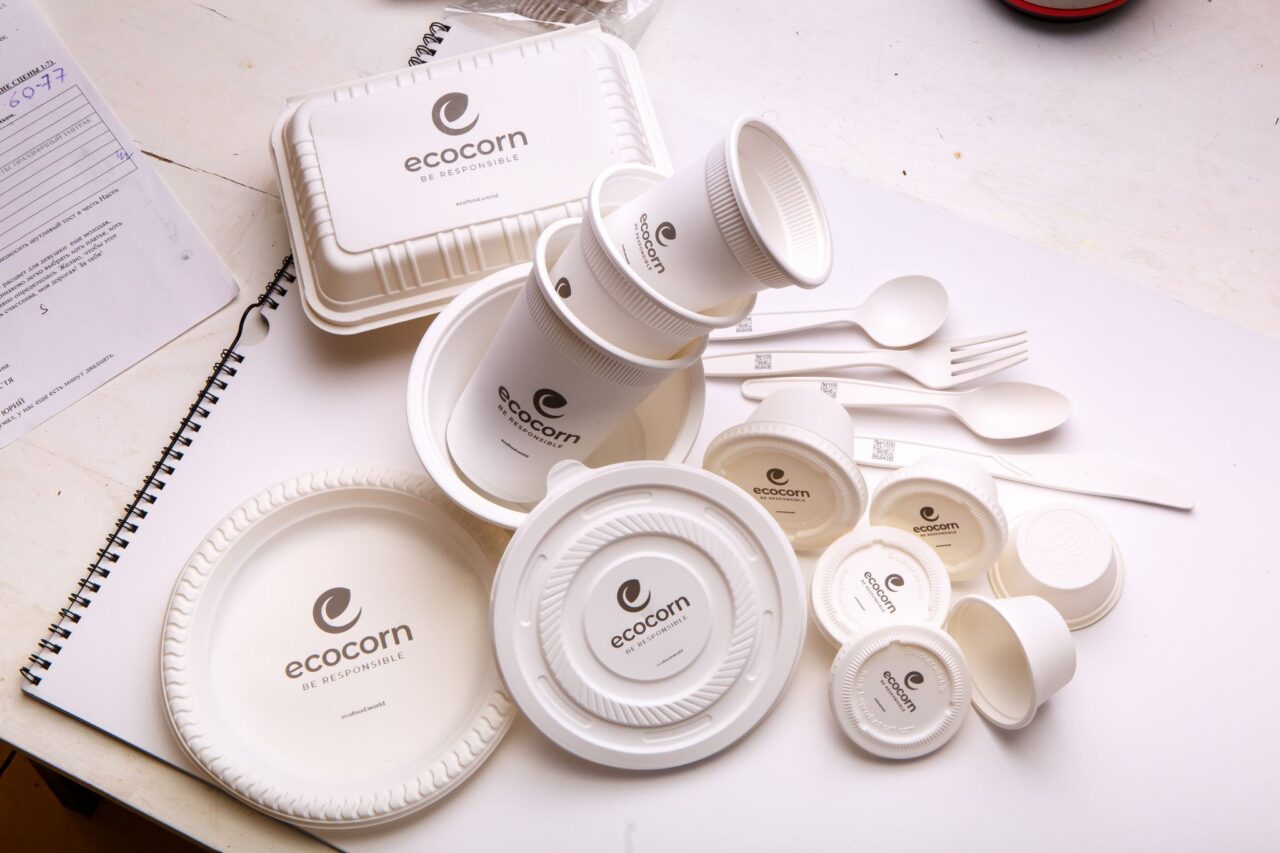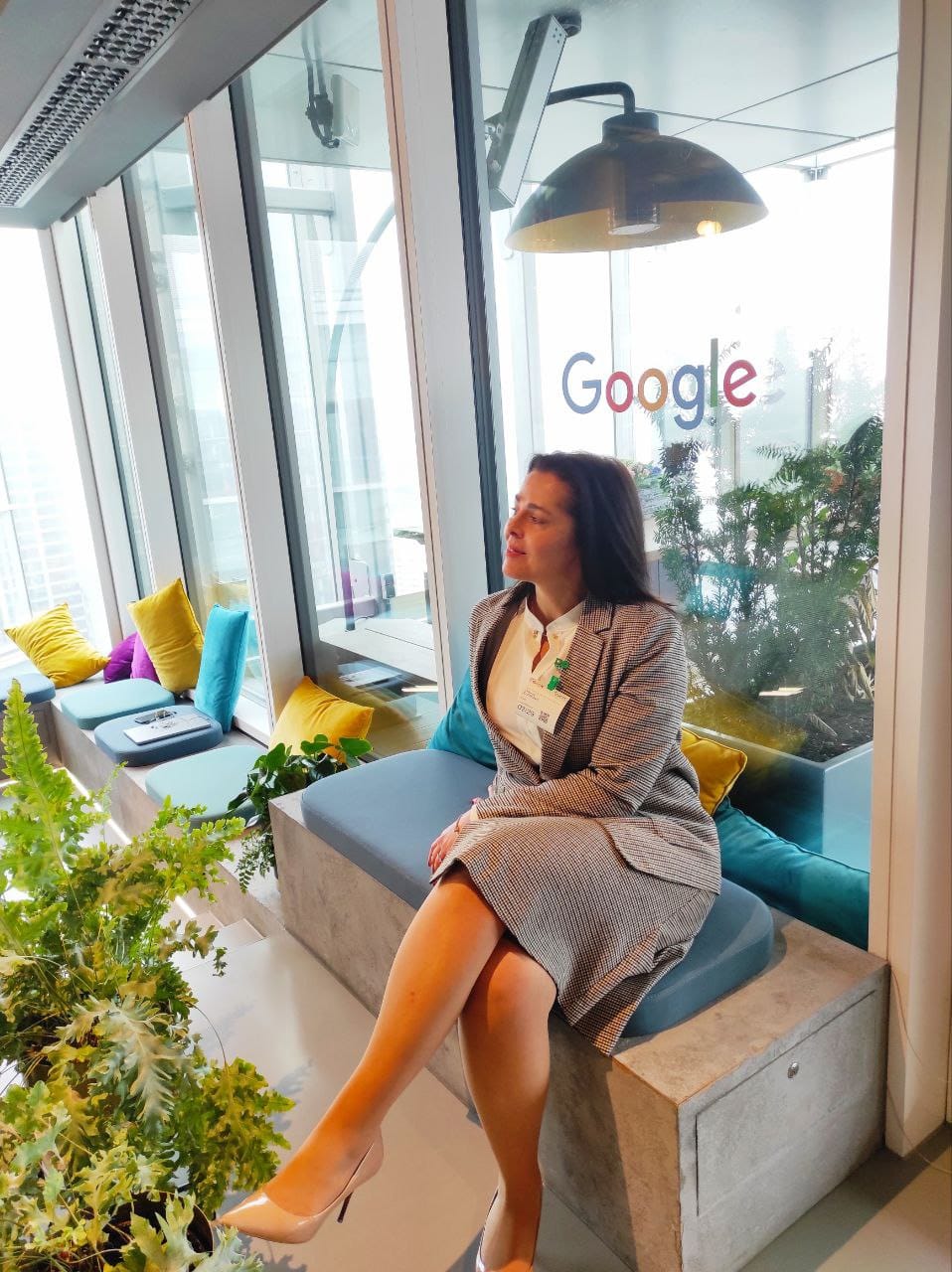Today, we interviewed Valeriia Kuzmenko, the founder of EcoCorn – a manufacturer of environmentally friendly and biodegradable disposable tableware and packaging made from cornstarch-based polymer, and an alumna of last year’s Export Academy. Discover her inspiration and the changes she made after the program.
Interviewer: Thank you so much for taking the time to speak with us today, Valeriia. It’s been a year since you graduated from the Export Academy, and we’d love to hear about your experiences since then. How has your company changed in that time?
Valeriia: Well, it’s been a whirlwind! Even while I was still a student in the program, I started putting the knowledge and skills I was learning into practice. The Export Academy really gave me the confidence to take the leap, and I’m proud to say that I launched my own European company called Ecocorn Group. It’s been growing steadily, and I’m excited to see what the future holds.
Interviewer: That’s fantastic! Have you been able to expand your export sales and enter any new markets?
Valeriia: Absolutely! The Export Academy definitely helped me overcome my fear of exporting. Before the program, it wasn’t a major focus for us – we relied mostly on clients finding us organically. But the Academy gave me the tools I needed to actively pursue export opportunities. We’ve had some amazing experiences in Europe, but it’s definitely been an eye-opening experience. The markets there are very different from what we’re used to in Ukraine, both in terms of business practices and consumer behavior. Luckily, with the knowledge I gained from the program, I was able to see these differences as challenges to overcome, rather than roadblocks. As for production in Europe, that’s part of the long-term plan, but for now, I’m focused on developing our export activities further. We have a strategic plan in place, and we’re taking things one step at a time.
Interviewer: Interesting. When you say “challenges,” were there any specific markets that you found particularly difficult to break into?
Valeriia: That’s an interesting question. I don’t necessarily think there are “difficult” markets, per se. The challenges come more from a lack of knowledge or understanding of the specific market and its regulations. If you don’t take the time to research the market, learn the cultural norms, and understand how business is done there, then of course it’s going to be difficult. Personally, I believe that there are no unattainable goals, only insufficient efforts – with the right preparation and approach, any market can be successfully entered.
But if come back to your question, I highlight the Nordic countries, they were very unexpected for us. This region of Europe is completely different. And it was very interesting to understand it.
Interviewer: The Export Academy clearly had a significant impact on your business. Can you tell us more about how the program helped you?
Valeriia: The program was truly invaluable. Before the Academy, my knowledge of exporting was scattered. The program helped me connect the dots and provided me with a comprehensive understanding of everything involved in exporting successfully. What was truly exceptional was the practical aspect – being able to learn and then immediately apply that knowledge to my own company was a game-changer. The instructors were fantastic, always happy to answer my questions (believe me, there were many!), and the network of fellow participants became a great source of support and encouragement.

Interviewer: Sounds like a very supportive environment. Now, as you’ve ventured into international markets, what have been some of the biggest challenges you’ve faced? Do you have any advice for other companies looking to follow in your footsteps?
Valeriia: Absolutely. The key is understanding the market you’re entering, it is completely different than you can think. There is a theory called the Iceberg theory. Its essence is that what you see “above the water” is only a small part of the whole. Therefore, the differences that you observe in people in a new market are just an external manifestation of their different perception of the world, different from yours. And everything else follows from this. So, don’t just jump in – take the time to research the history, traditions, and consumer behavior of the target country. Learning the language can be incredibly helpful as well. Be patient and adaptable – things will be different, and that’s okay. Embrace the learning curve and focus on building relationships.
Interviewer: That’s great advice. Looking ahead, what are your plans for expanding your export activities?
Valeriia: We’re fully committed to further developing our export presence. It’s not just good for the company’s growth, but it also creates a sense of security and stability for my team. Plus, seeing a Ukrainian company succeed internationally sends a positive message and helps strengthen the economy as a whole.
Interviewer: On a personal level, how has the past year changed you professionally?
Valeriia: The Export Academy definitely opened a new door for me professionally. Export management is a unique and challenging field, and I’m really enjoying the complexity of it. Beyond that, the program has led to several exciting new project opportunities where I act as an export consultant or FEA manager. It’s been a privilege to work with both Ukrainian and European companies. Since my main company runs quite smoothly without my daily involvement, I have the flexibility to take on these additional projects and pursue other interests outside of work.
Interviewer: Interesting. Has your opinion of the Export Academy changed at all since you graduated?
Valeriia: Not a bit! In fact, my appreciation for the program has only grown stronger. The quality of instruction, the supportive environment, and the connections I made with other participants – it all had a profound impact on my life and career.
Interviewer: Did the alumni network from the Export Academy play a role in your success?
Valeriia: It definitely does. Ideally, I’d love to be more involved and maintain regular communication with everyone. Unfortunately, with the demands of running my own company, free time is a precious commodity. But even though I can’t actively participate as much as I’d like, I have immense admiration for the network and its members. They’re all incredibly passionate about their businesses and dedicated to contributing to the success of the Ukrainian economy. It’s truly inspiring.
Interviewer: That’s wonderful. Now, to shift gears a bit, what motivates you and your team the most?
Valeriia: Personally, there’s nothing more fulfilling than seeing my colleagues grow professionally. Witnessing them develop their skills and achieve their goals is incredibly rewarding. As a team, we’re driven by a shared sense of purpose. We all believe in what we’re doing, and we know that our success can have a positive impact on the company and the people who work here.
Interviewer: That’s a powerful motivator. Finally, do you have any recommendations for business literature or films that have been particularly inspiring for you?

Valeriia: Honestly, with my busy schedule, I don’t get as much time for leisure reading or watching business-related content as I’d like. But when I do, I gravitate towards autobiographies written by successful entrepreneurs. Books like Phil Knight’s “Shoe Dog” and Richard Branson’s “Virgin Way of Doing Business” offer valuable insights and a glimpse into the minds of those who built empires. Another book that really resonated with me was “Work Rules!” by Laszlo Bock, who used to be the Senior Vice President of People Operations at Google. It offers a fascinating look at Google’s company culture and how they build successful teams. I actually had the chance to visit their European office a while back and speak with some former Google employees. It was incredible to see the “Google virus” in action – this passion and dedication that permeates the entire company.
Interviewer: Those sound like excellent recommendations. Thank you so much for your time and insights, Valeria. It’s been a pleasure speaking with you.
Valeriia: The pleasure is all mine! Thank you for the opportunity to share my story.
